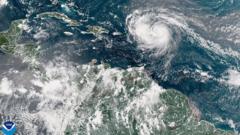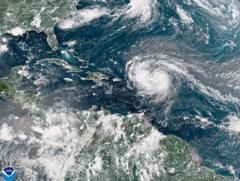In a recent development, the Trump administration has taken substantial steps to pivot away from the conversation surrounding climate change, undermining scientific research and eradicating data collection efforts, which may hinder the nation’s preparedness for environmental consequences.
The U.S. Climate Crisis: The Trump Administration's Approach to Environmental Policy

The U.S. Climate Crisis: The Trump Administration's Approach to Environmental Policy
The article examines the Trump administration's stance on climate change and its implications for environmental science and policy.
The article text:
In a controversial move that has drawn criticism from climate scientists and environmental advocates alike, the Trump administration has signaled its intent to largely disregard the economic implications of climate change in its policy-making. With a focus on maximizing energy production, the administration is not simply ignoring the realities of global warming; it is actively dismantling mechanisms that would allow for an effective understanding and response to this pressing issue.
Significantly, the administration's recent decisions include the termination of numerous climate research initiatives, resulting in the dismissal of some of the country's leading scientists. Furthermore, the government has ceased tracking critical greenhouse gas emissions, data that has been foundational in assessing the impact of climate change on various sectors including agriculture, health, and the economy over the past decade and a half.
Remarks from Agriculture Secretary Brooke Rollins encapsulate the administration's sentiment: “We’re not doing that climate change, you know, crud, anymore,” she stated, dismissing the importance of ongoing research and data collection.
Experts are voicing their concerns that this approach erodes the structure necessary for national discussions on climate change, with Daniel Swain, a climate scientist from UCLA, claiming that the “notion of there being any shared factual reality just seems to be completely out the window.”
In addition to the dismantling of climate data initiatives, the administration's budget cuts have adversely affected the National Weather Service and limited funds for disaster relief from the Federal Emergency Management Agency. These decisions are viewed as steps that diminish the nation’s preparedness for natural disasters, including hurricanes and wildfires, which are expected to become more frequent and severe due to climate change.
As the discourse around climate management shifts under the Trump administration, the long-term consequences for environmental policy and disaster resiliency remain to be seen, prompting concerns among scientists, policymakers, and the public alike.
In a controversial move that has drawn criticism from climate scientists and environmental advocates alike, the Trump administration has signaled its intent to largely disregard the economic implications of climate change in its policy-making. With a focus on maximizing energy production, the administration is not simply ignoring the realities of global warming; it is actively dismantling mechanisms that would allow for an effective understanding and response to this pressing issue.
Significantly, the administration's recent decisions include the termination of numerous climate research initiatives, resulting in the dismissal of some of the country's leading scientists. Furthermore, the government has ceased tracking critical greenhouse gas emissions, data that has been foundational in assessing the impact of climate change on various sectors including agriculture, health, and the economy over the past decade and a half.
Remarks from Agriculture Secretary Brooke Rollins encapsulate the administration's sentiment: “We’re not doing that climate change, you know, crud, anymore,” she stated, dismissing the importance of ongoing research and data collection.
Experts are voicing their concerns that this approach erodes the structure necessary for national discussions on climate change, with Daniel Swain, a climate scientist from UCLA, claiming that the “notion of there being any shared factual reality just seems to be completely out the window.”
In addition to the dismantling of climate data initiatives, the administration's budget cuts have adversely affected the National Weather Service and limited funds for disaster relief from the Federal Emergency Management Agency. These decisions are viewed as steps that diminish the nation’s preparedness for natural disasters, including hurricanes and wildfires, which are expected to become more frequent and severe due to climate change.
As the discourse around climate management shifts under the Trump administration, the long-term consequences for environmental policy and disaster resiliency remain to be seen, prompting concerns among scientists, policymakers, and the public alike.




















